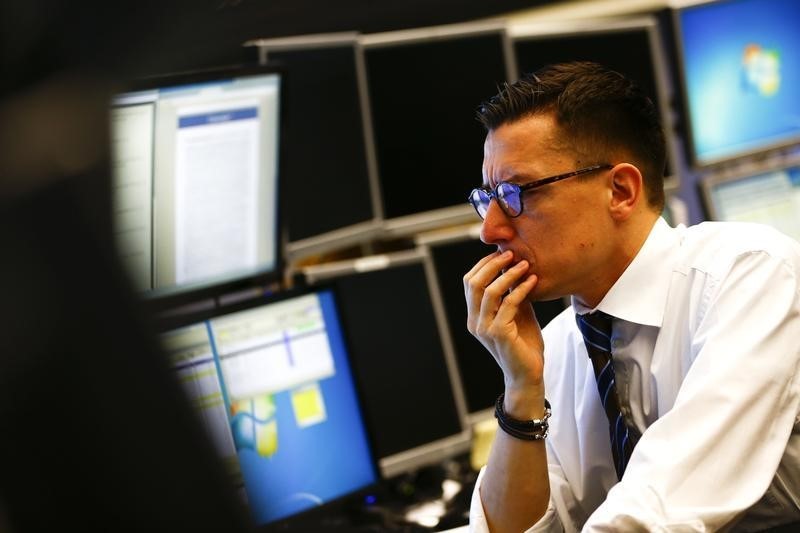Capstone Holding Corp. lowers convertible note conversion price to $1.00
* MSCI World share index turns lower
* European shares falter after positive open
* Wall Street futures down
* Gold climbs near $1,500/oz
* Yen shines due to safe haven demand
* Sterling near January 2017 lows vs dollar
* Argentina markets expected to get mauling after primary
elections
By Marc Jones
LONDON, Aug 12 (Reuters) - Persistent concerns about a
prolonged U.S.-China trade war and a no-deal Brexit kept the yen
and bond bulls charging on Monday, while Argentina's markets
were set to crash after voters gave its president an election
mauling.
Early gains for Asia and Europe's main bourses had long
disappeared .EU and Wall Street futures were 0.6-0.8% in the
red as traders limbered up in New York for another potentially
volatile week. .N .MIAPJ0000PUS .
Chinese stocks .CSI300 saw a rally of more than 1% after
the yuan avoided further drama CNY=PBOC and financial
regulators relaxed margin financing rules there late on Friday,
but safety remained the name of the game. .SS
Gold resumed its rise while FX safe harbour, the Japanese
yen, shot to its highest in nearly a year and a half at 105.15
yen against the dollar having also gained smartly against the
euro EURJPY= and Brexit-bruised British pound GBPJPY= .
/FRX
"Risk indicators and global markets have become more shaky
and the yen is reflecting those concerns, and safe-haven
shelters like the yen and the Swiss franc should continue to
benefit," said Commerzbank currency strategist Esther Reichelt.
In bond markets, the demand for guaranteed income was also
unrelenting. GVD/EUR
U.S. Treasuries and German bunds stayed strong while Italy's
debt gave the rally an extra boost after Fitch kept the
country's rating unchanged despite the increased possibility of
snap elections being called there.
Calls for a snap poll by the leader of the far-right League,
Matteo Salvini, ran into mounting resistance from other parties
whose support would be needed for the plan to succeed.
"Fitch kept Italy's rating unchanged and some market
participants may be betting that a snap election could be
delayed," said DZ Bank rates strategist Sebastian Fellechner,
referring to the fall in yields.
With economists waiting for a batch of global data this
week, Goldman Sachs became the latest heavyweight to cut its
U.S. growth forecast at the weekend and give a warning that a
U.S.-China trade deal before the 2020 U.S. presidential election
now looked unlikely. One week ago, China allowed the yuan CNY=CFXS to break
through the key 7-per-dollar level for the first time since
2008, prompting Washington to label Beijing a currency
manipulator and sparking market ructions.
The International Monetary Fund said on Friday that it stood
by its assessment that the value of China's yuan was largely in
line with economic fundamentals. IN ARGENTINA
Argentina's financial markets were bracing for impact after
voters there soundly rejected President Mauricio Macri's austere
economic policies in primary elections, casting serious doubt on
his chances of re-election in October.
With 99% of the ballots counted, a coalition backing
opposition moderate Peronist candidate Alberto Fernandez - whose
running mate is former president Cristina Fernandez de Kirchner
- had won by a far wider-than-expected 15.5 percentage points
with 47.65% of votes. Argentina's euro-denominated 2028 bond XS1715303779=TE had
slumped more than 11 cents in Europe and brokers were sounding
the alarm about both a sharp plunge in the peso ARS= and in
the country's equity markets in Buenos Aires.
"We expect a significant sell-off in EXD (hard currency)
assets and heavy pressure in ARS (Argentine peso) with a
potential devaluation in coming weeks," Bank of America Merrill
Lynch analysts said in a note.
"Investors are likely to re-price bonds to show a high
likelihood of policy transition and a significant likelihood of
a debt restructuring," they added.
Traders also had pre-market calls pointing to 20% plunges
for bank shares such as Banco Supervielle SUPV.BA and Grupo
Financiero Galicia GGAL.BA
The peso ARS= has already shed over 8% in the past month,
and analysts widely expect the central bank to try and stop a
further major downward move down, but HSBC's senior Latam
economist, Jorge Morgenstern, cautioned it might be
insufficient.
"We could see an important sell-off in ARS today, and we
adopt a cautious short-term view".
Wall Street has been in the doldrums since President Donald
Trump said on Friday the United States would not make a trade
deal with China for now, though he also said talks would
continue. White House trade adviser Peter Navarro subsequently said
that the United States was still planning to hold another round
of trade talks with Chinese negotiators. In commodities, oil prices also reflected the concerns about
global growth and trade, having risen sharply on Friday on a
drop in European inventories and production cuts by the
Organization of the Petroleum Exporting Countries.
International benchmark Brent crude futures LCOc1 were at
$58.16 a barrel, down 37 cents from their previous settlement.
U.S. West Texas Intermediate (WTI) CLc1 futures were at
$53.89 per barrel, down 61 cents from their last close.
Both benchmarks fell last week, with Brent losing more than
5% and WTI falling about 2%.
"The market is facing a buyers' strike," said Michael Tran,
commodity strategist at RBC Capital Markets, noting the low
level of investors' long positions betting on higher prices.
"Despite the laundry list of disruptions and additional
barrels at risk, investor length is currently near a multi-year
low."
<^^^^^^^^^^^^^^^^^^^^^^^^^^^^^^^^^^^^^^^^^^^^^^^^^^^^^^^^^^^
Rising gold prices https://tmsnrt.rs/2YD8nsu
^^^^^^^^^^^^^^^^^^^^^^^^^^^^^^^^^^^^^^^^^^^^^^^^^^^^^^^^^^^>
